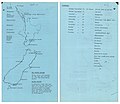File:Māori Land March (1975) - Route of March (20631264354).jpg

Original file (4,622 × 4,002 pixels, file size: 1.84 MB, MIME type: image/jpeg)
Summary
| DescriptionMāori Land March (1975) - Route of March (20631264354).jpg |
On 13 October 1975, a hikoi of 5,000 marchers arrived at Parliament to protest the ongoing alienation of Māori land. Organised by Māori land rights group Te Rōpū O Te Matakite and led by Dame Whina Cooper, the hikoi had departed from Te Hapua, Northland, on 14 September, and arrived in Wellington after marching 1,100 kms throughout the North Island. Te Rōpū O Te Matakite regarded the land march as ‘a climax to over a hundred and fifty years of frustration and anger over the continuing alienation of their lands’. Upon their arrival at Parliament they presented a petition signed by 60,000 people from around New Zealand to Prime Minister Bill Rowling. The petition called for an end to monocultural land laws which excluded Māori cultural values, and asked for the ability to establish legitimate communal ownership of land within iwi. The hikoi represented a watershed moment in the burgeoning Māori cultural renaissance of the 1970s. It brought unprecedented levels of public attention to the issue of alienation of Māori land, and established a method of protest that was repeatedly reused in the following decades. To mark the 40th anniversary of the Land March, Archives New Zealand has created an album on Flickr to highlight key documents within our holdings that relate to the event. These include the petition with 60,000 signatures presented by Dame Whina Cooper to Prime Minister Bill Rowling, images of the Land March approaching Wellington City and correspondence related to the planning that went on behind the scenes to support the march taking place. This route for the Land March was put together by Te Rōpū O Te Matakite, the organisation behind the march. Archives Reference: AAMK 869 W3074 684/d 19/1/774 Part 1 (R11838413) This file is open access and can be seen in our Wellington Reading Room. For updates on our On This Day series and news from Archives New Zealand, follow us on Twitter: www.twitter.com/ArchivesNZ Material from Archives New Zealand |
| Date | |
| Source | Māori Land March (1975) - Route of March |
| Author | Archives New Zealand from New Zealand |
Licensing
- You are free:
- to share – to copy, distribute and transmit the work
- to remix – to adapt the work
- Under the following conditions:
- attribution – You must give appropriate credit, provide a link to the license, and indicate if changes were made. You may do so in any reasonable manner, but not in any way that suggests the licensor endorses you or your use.
- share alike – If you remix, transform, or build upon the material, you must distribute your contributions under the same or compatible license as the original.
| This image was originally posted to Flickr by Archives New Zealand at https://flickr.com/photos/35759981@N08/20631264354. It was reviewed on 8 September 2016 by FlickreviewR and was confirmed to be licensed under the terms of the cc-by-sa-2.0. |
8 September 2016
Captions
Items portrayed in this file
depicts
creator
some value
published in
Flickr
copyright status
copyrighted
copyright license
Creative Commons Attribution-ShareAlike 2.0 Generic
collection
Archives New Zealand
inception
3 September 2015
source of file
file available on the internet
media type
image/jpeg
Flickr photo ID
File history
Click on a date/time to view the file as it appeared at that time.
| Date/Time | Thumbnail | Dimensions | User | Comment | |
|---|---|---|---|---|---|
| current | 20:56, 8 September 2016 |  | 4,622 × 4,002 (1.84 MB) | Vanished Account Byeznhpyxeuztibuo | Transferred from Flickr via Flickr2Commons |
File usage
The following page uses this file:
Metadata
This file contains additional information, probably added from the digital camera or scanner used to create or digitize it.
If the file has been modified from its original state, some details may not fully reflect the modified file.
| Orientation | Normal |
|---|---|
| Horizontal resolution | 28.3465 dpc |
| Vertical resolution | 28.3465 dpc |
| Software used | Adobe Photoshop CC 2014 (Windows) |
| File change date and time | 15:54, 3 September 2015 |
| Color space | sRGB |
| Date and time of digitizing | 03:54, 4 September 2015 |
| Date metadata was last modified | 03:54, 4 September 2015 |
| Unique ID of original document | xmp.did:ba6fd9fb-804c-bf43-b3b2-27dfe3c4aa3e |
